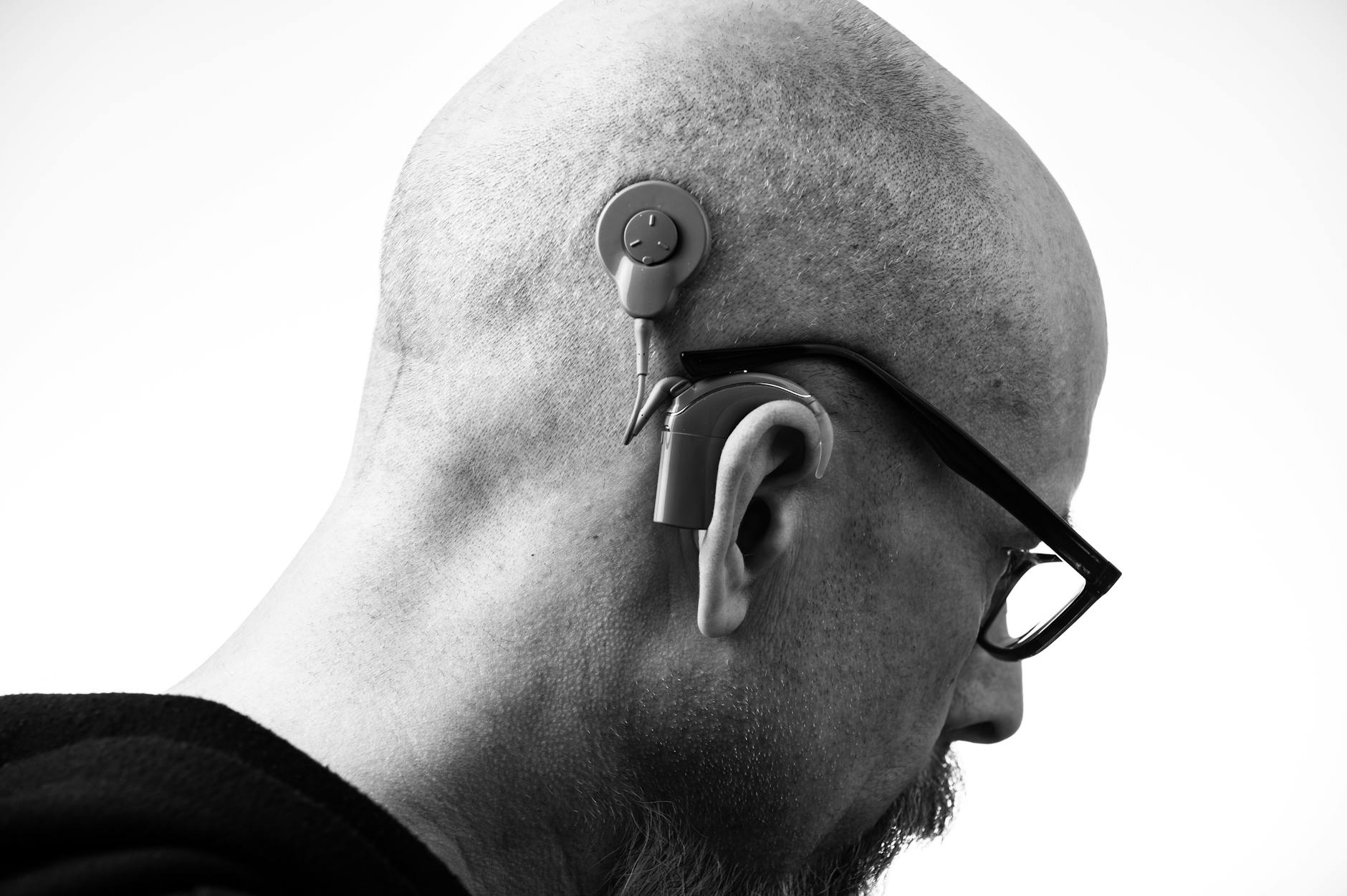Growing a baby changes almost everything—your ears included. If you’ve noticed new ear fullness, muffled hearing, ringing, or even spells of dizziness, you’re not imagining it. Pregnancy can affect the way your ears and brain process sound. Here’s what’s likely normal, what warrants a closer look, and how to feel more in control of your hearing during pregnancy and after delivery.
Why Pregnancy Can Change How You Hear
During pregnancy, your body’s chemistry and circulation take on a new rhythm. These changes can influence the ear’s delicate systems—from the eardrum and middle ear to the fluid-filled inner ear that powers both hearing and balance.
The physiology in plain language
- More blood volume and fluid shifts: Extra fluid and softer tissues can swell the nose and Eustachian tubes (the tiny airways that equalize pressure between your ears and your throat). That swelling can create a “plugged” or echoey feeling.
- Hormonal changes: Estrogen and progesterone influence blood vessels and mucous membranes, which can contribute to nasal congestion (“pregnancy rhinitis”) and ear pressure.
- Blood pressure fluctuations: While many pregnancies have normal blood pressure, elevated pressures (including preeclampsia) can sometimes show up as pulsatile tinnitus (a heartbeat-like whoosh) or sudden ear symptoms that need medical attention.
- Immune modulation: Your immune system adapts in pregnancy, which can change how you experience inflammation, allergies, or pre-existing ear conditions.
Common Ear and Hearing Symptoms in Pregnancy
Not everyone will notice changes, but these are the most frequent, generally harmless experiences:
Ear fullness and muffled hearing
Often linked to pregnancy-related congestion or Eustachian tube dysfunction. You might feel “underwater,” hear your own voice booming (autophony), or have popping sensations when swallowing.
Tinnitus (ringing, buzzing, whooshing)
Tinnitus can appear for the first time or get louder. It may pulse with your heartbeat (pulsatile tinnitus) or sound steady. Stress, fatigue, and quiet rooms can make it more noticeable.
Sound sensitivity
Some people feel that everyday noises are suddenly sharp or overwhelming, particularly when tired or in echoey spaces.
Dizziness or imbalance
Lightheadedness is common in pregnancy for many reasons. True spinning vertigo is less common, but existing inner-ear conditions can flare and cause off-balance moments.
What’s Likely Benign vs. When to Call
Most ear changes in pregnancy are temporary and improve after delivery. Still, some symptoms deserve prompt evaluation.
Usually mild and self-limiting
- Gradual ear fullness or stuffiness with nasal congestion
- Intermittent, non-pulsing tinnitus that fluctuates with stress or sleep
- Occasional popping with swallowing or yawning
- Brief lightheadedness when standing too quickly
Red flags: seek care promptly
- Sudden hearing loss in one ear (or rapidly worsening hearing in either ear)
- New, one-sided ear fullness with spinning vertigo or severe imbalance
- Pulsatile tinnitus (heartbeat-like whoosh), especially with headache, visual changes, or upper-right abdominal pain
- Severe ear pain with fever, drainage, or trauma
- Persistent, disabling dizziness or fainting
If a red flag applies, contact your obstetric provider and ask for urgent evaluation. An ENT (ear, nose, and throat specialist) and audiologist can perform safe, noninvasive tests during pregnancy to guide next steps.
Conditions That Can Interact with Pregnancy
Pregnancy rhinitis and Eustachian tube dysfunction
Nasal lining swelling is common in pregnancy. When it affects the tiny canals that ventilate your ears, you may notice pressure, muffled sound, and occasional crackling. This usually settles after birth.
Otosclerosis
Otosclerosis is a bone remodeling condition of the middle ear that can cause conductive hearing loss. Some studies suggest it can first appear or progress in pregnancy for certain individuals, though research is mixed. If you have a family history or notice progressive hearing difficulty, schedule a hearing test and ENT consult to understand your options (including hearing aids now and surgical discussions after pregnancy if appropriate).
Menière’s disease
In people who already have Menière’s, pregnancy can be a time of improvement, stability, or flare—it’s unpredictable. Work with your OB and ENT to tailor fluid and nutrition strategies that are safe for you and your baby.
High blood pressure disorders of pregnancy
Preeclampsia and other hypertensive disorders require close monitoring. Ear symptoms like pulsatile tinnitus, sudden hearing shifts, or visual changes warrant prompt medical attention.
Anemia
Low iron is common in pregnancy and can contribute to fatigue, breathlessness, and sometimes more noticeable tinnitus. Treating anemia under your OB’s guidance can help overall wellness, which may indirectly ease ear symptoms.
Practical Relief: Safe, Gentle Strategies
Start with non-drug, low-risk steps. Always check with your obstetric provider before starting medications or supplements.
Ease ear pressure and fullness
- Humidify and hydrate: Use a cool-mist humidifier and drink water throughout the day to soothe nasal and Eustachian tube linings.
- Saline rinses or sprays: Isotonic saline can reduce nasal congestion without medication. Use clean technique, especially with neti pots.
- Gentle pressure equalization: Swallow, sip water, or chew gum. Some benefit from gentle autoinflation (e.g., blowing up a balloon through the nose with a device like Otovent); ask your provider if this is appropriate for you.
- Sleep positioning: Slightly elevate your head and try side-sleeping to reduce overnight congestion.
- Allergy management: If allergies contribute, discuss safe options with your OB (non-drowsy strategies are often preferred).
Soften tinnitus and sound sensitivity
- Sound enrichment: Use soft background sound at night (rain, fan, gentle music) to blend with ringing and reduce the contrast in quiet rooms.
- Protect, but don’t overprotect: Wear earplugs in truly loud environments (concerts, power tools). Avoid wearing plugs all day in normal sound—overuse can increase sensitivity.
- Stress and sleep care: Short relaxation practices (paced breathing, gentle stretches, mindfulness) and consistent sleep routines can lower tinnitus intrusiveness.
- Limit stimulants: If your OB has cleared modest caffeine, be mindful of timing—late-day caffeine can escalate night-time ringing for some people.
Dizziness basics
- Stand slowly, steady yourself, and keep snacks handy if your sugar dips.
- Stay hydrated and discuss morning sickness strategies with your OB.
- If you have a known vestibular condition, ask about vestibular therapy—a safe, exercise-based program tailored for balance.
Medication notes
Some over-the-counter decongestants and certain prescription medications are not recommended at specific times in pregnancy. Always confirm safety with your obstetric provider before using decongestants, antihistamines, nasal steroids, or pain relievers.
Hearing Care During Pregnancy
Get a baseline and track changes
- Schedule a hearing test: Pure-tone audiometry, middle ear measures (tympanometry), and speech-in-noise testing are safe and can document your baseline.
- Keep a simple symptom diary: Note what helps or worsens fullness, ringing, or dizziness to guide targeted advice.
Hearing aids are safe
- If you already wear hearing aids: Ask your audiologist to fine-tune settings if your hearing fluctuates or if tinnitus is louder. Many devices have tinnitus sound support you can enable.
- If you’re newly considering amplification: Modern hearing aids are noninvasive. Even for mild hearing loss, better audibility can reduce listening fatigue—helpful when energy is precious.
Ear care do’s and don’ts
- Do treat earwax gently: If you’re prone to wax build-up, ask your clinician about safe softening drops. Avoid ear candles and deep cotton swab use, which can injure the ear.
- Don’t self-treat ear infections: Ear pain, fever, or drainage need a clinician’s evaluation for safe treatment choices in pregnancy.
Planning for Delivery and the Postpartum Period
Your ears may take a few weeks to recalibrate as fluid shifts normalize after birth. Tinnitus often settles; congestion-related fullness usually improves within the first 1–2 months.
- Bring your hearing devices: If you use hearing aids, pack them for the hospital and bring extra batteries or a charger.
- Communicate needs: Let your care team know if you have hearing difficulty. Simple steps (facing you, speaking clearly) reduce strain at a busy time.
- Mind the noise: Hospitals can be loud. Keep hearing protection handy for intense sounds, but avoid overuse.
- Postpartum check-ins: If tinnitus, fullness, or hearing changes persist beyond 6–8 weeks, book a hearing test. If you had red flags during pregnancy, don’t wait—follow through sooner.
When to See an Audiologist or ENT
Consider professional help if you experience:
- Noticeable, persistent hearing difficulty or one ear hearing worse than the other
- Tinnitus that disrupts sleep or concentration
- Recurring vertigo or imbalance
- Ear fullness and muffled hearing that lasts more than a few weeks
An audiologist can measure your hearing and recommend practical tools—from communication strategies to hearing technology and tinnitus management. An ENT can evaluate medical causes and coordinate care with your obstetric provider when treatment is needed.
Bottom Line
Ear and hearing changes in pregnancy are common—and usually temporary. Simple steps can make a big difference, and timely evaluation catches the rare but important issues early. If you’re unsure, trust that instinct and reach out to an audiologist or ENT in partnership with your obstetric team. Your hearing matters just as much as the rest of your health while you’re expecting.
Frequently Asked Questions
Is ringing in the ears (tinnitus) normal during pregnancy?
Tinnitus is fairly common in pregnancy and often relates to fluid shifts, congestion, stress, or fatigue. It typically softens after delivery. Use gentle sound enrichment, manage stress, and sleep well. If it’s pulsatile (heartbeat-like), sudden, one-sided, or paired with headache or vision changes, contact your obstetric provider promptly.
Can pregnancy make otosclerosis worse?
Some individuals first notice conductive hearing loss from otosclerosis during pregnancy, and some report progression. Research is mixed, and not everyone is affected. If you notice progressive difficulty hearing, schedule an audiology evaluation and discuss findings with an ENT. Hearing aids can help immediately; surgical options are usually considered after pregnancy.
Are hearing aids safe to use while pregnant?
Yes. Hearing aids are noninvasive and safe in pregnancy. If your hearing or tinnitus fluctuates, your audiologist can adjust settings or enable tinnitus sound support features. If you’re new to hearing aids, a trial during pregnancy can reduce listening fatigue at work and home.
What should I do if I notice sudden hearing loss during pregnancy?
Treat sudden hearing loss as urgent. Call your obstetric provider and seek same-day ENT care. Early evaluation and management are important, and your medical team will choose treatments with pregnancy safety in mind.



